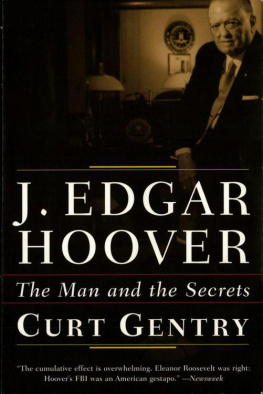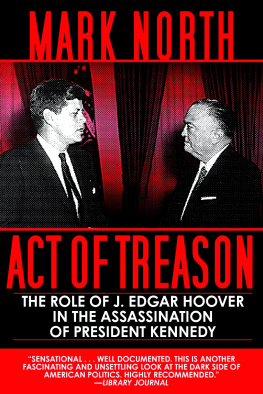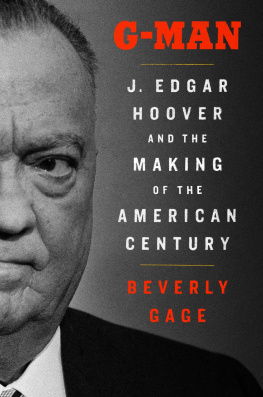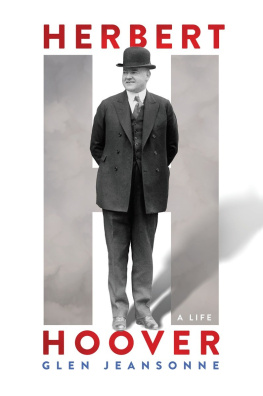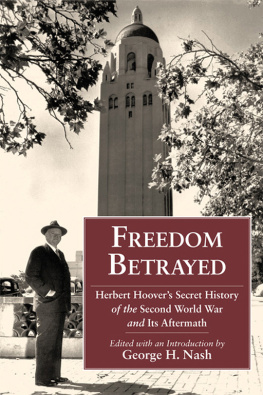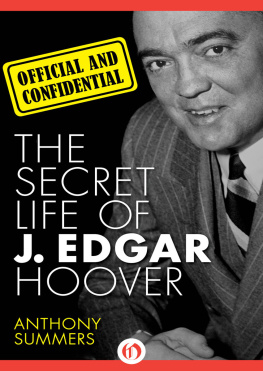J. Edgar Hoover
To my brother, G. Pat Gentry;
my editor, Eric P. Swenson;
and my good friends
Donald R. Hazlewood, Denne Bart Petitclerc,
and Tom and Bea McDadeeach of whom
gave something special to this book
Theres something addicting about a secret.
J. EDGAR HOOVER
It was a shocker. If anyone on this earth seemed immortalit was Mr. Hoover.
1
Tuesday, May 2,1972
J ames Crawford had no reason to feel apprehensive. But he did.
As he turned onto Thirtieth Place NW, he scanned both sides of the dead-end street.
Everything looked all right. There were no strange cars, little activity, only a few people leaving for work, all familiar.
They should have been. After all these years he knew their habits as well as his own.
Since he saw nothing out of the ordinary, the feeling should have gone away. But it didnt. Instinctively he knew something was wrong. He wondered if there had been any recent threats against the Boss.
Retired now, since January, Crawford no longer heard the daily scuttlebutt. For a secret outfit, the men sure talked a lot, though only among themselves. They even had a name for it: the grapevine. Yet if something really were wrong, surely someone, Annie or Tom or Miss Gandy, would have let him know.
Despite what some people believed, James Crawford had never been the Bosss bodyguard. A reporter for Ebony had written that years earlier and others had picked it up. It must be exciting, Mr. Crawford, being his bodyguard! people would say. At first hed corrected them, explaining that he was the Bosss chauffeurand quite proud to be thatbut, since they never seemed to believe him, thinking this was something hed been instructed to say, he finally stopped telling them otherwise. The truth was, he didnt even carry a gun, never had, in all those years. Oh, he knew how to shoot one. Hed gone through the training, at Quantico, living by himself and segregated, of course, for that was back in the forties. One of the very first of his people to go through. And hed been issued a gun. But hed left it in the clerks office. Never checked it out.
No, there hadnt been a threat. Hed have seen them by now. Others might not notice, but he could spot a surveillance blocks away. Sometimes when there was trouble, like the Communist things, as many as two dozen men would be watching this quiet residential street. The Bosss neighbors bragged it was the safest street in Washington, D.C. Only, nowhere was really safe anymore. Just a couple years back someone had stolen the Bosss Christmas tree lights!
Crawford spotted the black bulletproof Cadillac from two blocks away. It was parked on the left side of the street, facing him, directly in front of 4936exactly where it was supposed to be. The familiar sight should have reassured him. But it didnt.
Hed driven the car, or one like itthe first was a Pierce Arrowfor thirty-seven years. But no more. After his retirement his brother-in-law, Tom Moton, had become the Bosss new driver. All the problems were his now. No more fretting about blowouts, or brakes that had to be replaced every few hundred miles, because of the weight of the armor-plated chassis. No more worrying about the Bosss obsession with cleanliness or his frightening rages. Tom had inherited them all.
Though officially retired, Crawford came by nearly every day. The Boss didnt trust outside people, as he called them, so Crawford still supervised repairs on the house, maintained the gardens, fish pond, and yard. Todays job was one he especially enjoyed. The Boss had ordered some rosebushes flown in from his favorite nursery, Jackson & Perkins, and last night hed called, telling Crawford theyd arrived and asking him to come by at 8:30 to help him plant them.
Crawford was punctual. Which meant early. After driving to the end of the street and making a U-turn, parking behind the Cadillac but leaving enough room so it wouldnt be blocked if there were trouble, he checked his watch. It was exactly 8:15.
The housetwo stories, of red brick with cream trim and a gray slate roof, of the style older natives once called Federal Colonialwas set back from the street by a small front yard. Seeing it, Crawford grimaced. It was a habit by now. In 1968, when Crawford was hospitalized for brain surgery, the Boss, perhaps fearing that he wouldnt survive, had replaced his beloved Merion bluegrass with Astroturf. It still offended him.
Walking up the driveway, Crawford heard the two cairns, G-Boy and Cindy, barking inside. It wasnt their hungry whineAnnie Fields, the Bosss live-in cook and housekeeper, always fed them before the Boss came downbut their impatient yelp, the kind they made at night when the Boss was due home. Crawford guessed that for some reason the Boss had slept late.
That didnt happen often, even now that he was well along in years, for he remained a man of very rigid habits.
Waving to Annie and Tom, who were sitting in the kitchen drinking coffee, Crawford went around to the backyard and began unpacking the roses. He postponed digging the holes, unsure where the Boss wanted them.
Crawford did not keep track of the time, but apparently some fifteen or twenty minutes passed before Annie came out into the yard and told him that she was concerned. By now she should have heard the shower. Of course, the dogs had been barking.
Crawford said hed check.
Though the reason went unspoken, Crawford knew why Annie didnt want to go upstairs herself. Although he had a closet full of silk pajamas, the Boss slept in the nude.
The kitchen opened onto the dining room, and here, as throughout the rest of the house, there were so many antiques you had to zigzag your way around them. Together with the Oriental rugs, and the throw rugs on top of them, it was like walking through an obstacle course.
There were more antiques in the foyer, plus, at the foot of the stairs, facing the front door, a large autographed photo of the incumbent president with the Boss. (From Roosevelt to Nixon, theyd all hung here at one time, with the single exception of Truman.) On the first landing, the Boss appeared in an oil painting, as hed looked perhaps some thirty years earlier. (Elsewhere in the house, he was depicted in a large bronze bust, a plaster bust, in a wooden figurine, in scrimshaw, as well as carved in bas relief on the cover of the guest book.) Along the walls of the upstairs hallway, past the den and rarely used guest room, were dozens of drawings, etchings, and cartoons. The Boss was portrayed in nearly all of them, usually with an exaggerated bulldog chin. Interspersed were photographs of famous people, including many Hollywood stars, some present but mostly past. Again he was in almost all. The other people looked as if they were proud to be photographed with him.

